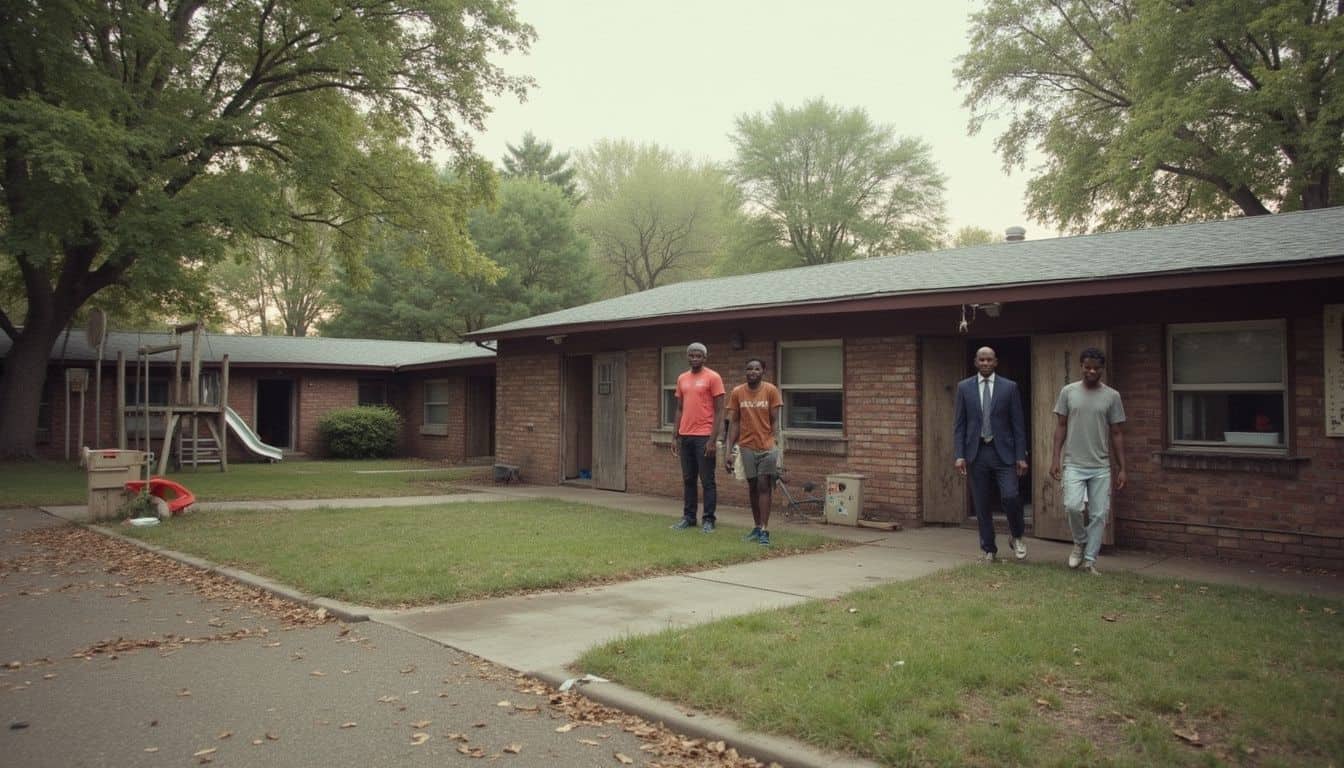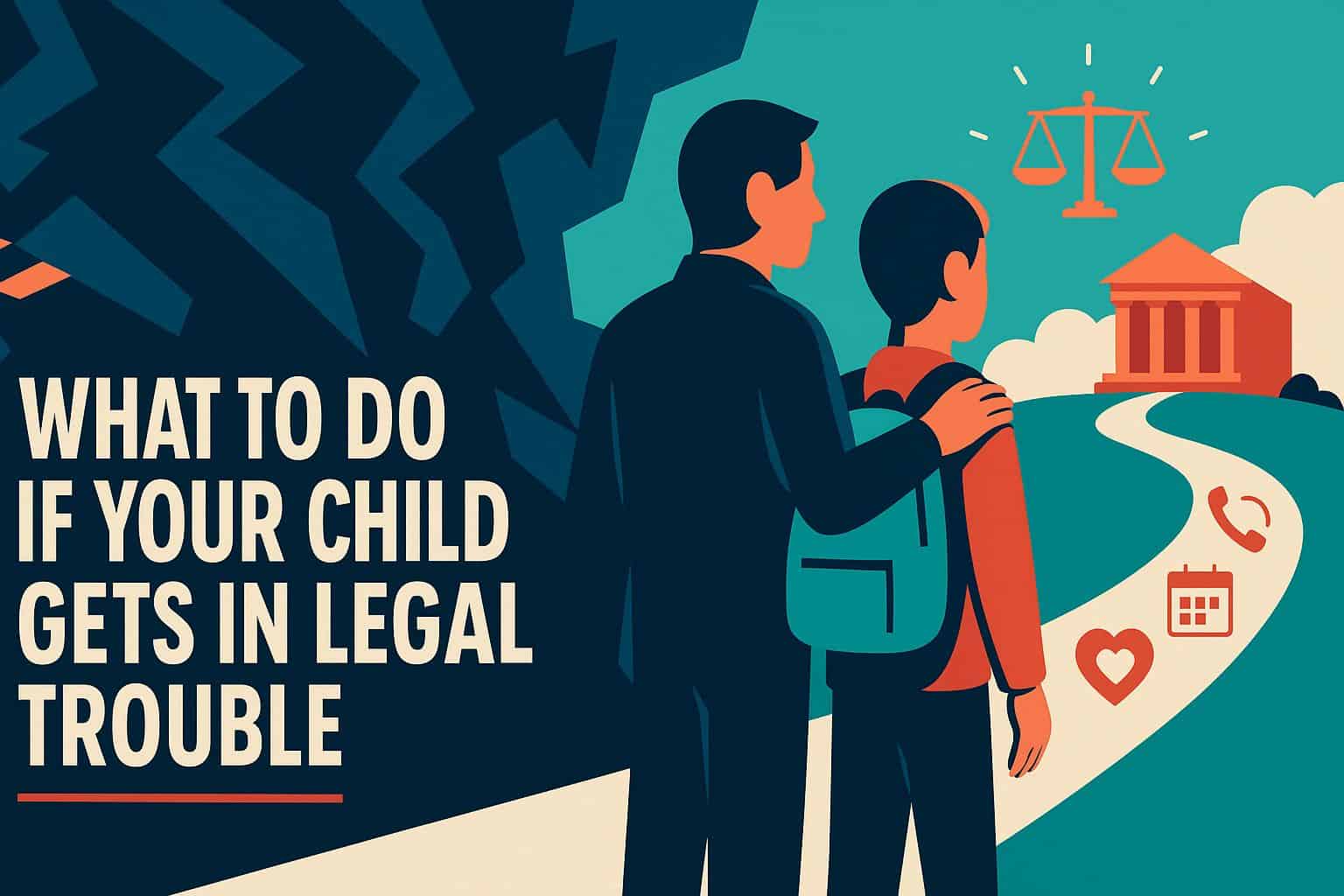Finding out your child is facing juvenile criminal charges is a moment that can shake any parent to their core. While teenagers often make poor choices as part of growing up, some mistakes can lead to serious legal consequences. Knowing what to do if your child gets in legal trouble is the first step toward protecting their future.
This guide will walk you through exactly how to respond, from the moment you get the call to finding the right criminal defense attorney. The calm, strategic actions you take today can make all the difference for your child’s tomorrow.
Key Takeaways
Immediately contact a specialized juvenile defense attorney and start a “case binder” to document every interaction with law enforcement and the courts.
Instruct your child to invoke their Fifth Amendment right to remain silent and never let them speak to police without a lawyer present.
Temporarily deactivate all social media accounts, as prosecutors regularly use posts, messages, and photos as evidence against a child.
Ask your attorney about alternatives like diversion programs or restorative justice, which focus on rehabilitation and can prevent a permanent record.
Proactively enrolling your child in therapy, like Cognitive Behavioral Therapy (CBT), can provide coping skills and be viewed favorably by the court.
Table of Contents
How should I stay calm and gather information if my child is in legal trouble?

The shock of your child’s arrest can be overwhelming, but your composure is one of your most powerful tools. Staying calm allows you to think clearly, make smart decisions, and advocate better for them during this crisis.
Your first step is to take a deep breath. Avoid making reactive decisions based on fear or anger. Your priority is to gather facts and secure professional help.
A crucial “insider” tip is to immediately create a “case binder,” either a physical notebook or a secure digital folder. This is where you will keep thorough notes of every interaction with police, court officials, and lawyers. Document everything:
- Who you spoke to: Get the full name and title of every officer, clerk, or attorney.
- When you spoke: Note the exact time and date of every phone call and meeting.
- What was said: Summarize the conversation and any instructions or information you were given.
- Key documents: Keep copies of any paperwork, such as arrest reports or court notices.
This organized record is invaluable for your future legal representation. In addition to case details, start gathering character references from teachers, coaches, or employers. The juvenile justice system focuses more on rehabilitation than punishment, so positive testimonials about your child’s character can be very influential.
Protecting your child’s rights

Your child has specific legal protections that police and prosecutors must respect during any criminal investigation. Understanding these rights helps you prevent critical mistakes that could harm their case.
Why shouldn’t my child talk to the police without a lawyer?
Police questioning without legal representation can be devastating to your child’s future. The single most important rule is this: your child should not answer any questions without an attorney present.
Under the Fifth Amendment, your child has the right to remain silent to avoid self-incrimination. Teach them to clearly state, “I want to remain silent, and I want a lawyer.” Officers may use deceptive tactics to get a child to talk, suggesting that staying quiet makes them look guilty or that talking will “help” them.
Police are legally permitted to lie to suspects during an interrogation to secure a confession. Studies have shown that because of their brain development, juveniles are up to three times more likely than adults to give a false confession under this kind of pressure.
According to the Innocence Project, a significant number of wrongful convictions of children involve false confessions. Even innocent statements can be taken out of context by the prosecution. What you need to know about your kid gets forced into situations that could have legal ramifications is that their best defense starts with silence.
How do I temporarily shut down my child’s social media accounts?
In today’s world, social media is a primary source of evidence. Prosecutors and police will scrutinize every post, picture, and private message for anything that can be used against your child. You must act quickly to manage their digital footprint.
The first step is to temporarily deactivate all of your child’s accounts on platforms like Instagram, TikTok, and Facebook. This prevents new posts that could complicate their case.
- Do Not Delete Content: An important warning from attorneys is to deactivate, not delete. Deleting posts can be viewed as destroying evidence, which could lead to more trouble.
- Change All Passwords: Secure every account by changing the passwords. This prevents your child from reactivating them or making new posts impulsively.
- Talk to Friends: Ask your child’s close friends not to post about the situation or tag your child in any photos or comments.
- Consider Monitoring Software: Tools like Bark or Qustodio can help monitor for harmful content or attempts to create new accounts.
Remember, even “deleted” content can often be recovered by law enforcement with a warrant. Proper social media management is not about hiding the truth, it’s about preventing misinterpretation.
Hire a Juvenile Defense Attorney

Your child needs a skilled attorney who lives and breathes juvenile law. A general criminal lawyer is not enough. A specialist understands the unique rules, procedures, and goals of the juvenile court system.
Juvenile court is fundamentally different from adult court. Its primary goal is rehabilitation, not punishment. This means the language, sentencing options, and overall philosophy are completely distinct. An experienced juvenile attorney knows how to use this focus on rehabilitation to argue for better outcomes for your child, like diversion programs instead of detention.
How do I find an attorney who specializes in juvenile law?
Finding the right lawyer requires focused research. You need someone who specifically handles juvenile cases and is familiar with your local court system. Start by contacting your state bar association for referrals or searching for legal professionals who are members of the National Juvenile Defender Center (NJDC).
Once you have a few names, schedule consultations and be prepared to ask specific questions. This isn’t just about experience, it’s about finding the right fit for your family.
- What percentage of your practice is dedicated to juvenile defense? You want a true specialist, not a generalist.
- What is your experience with charges like my child’s in this specific county? Familiarity with local judges and prosecutors is a major advantage.
- Will you be handling the case personally? Ensure your case won’t be passed off to a less experienced associate.
- What are your fees and payment structure? Discuss flat fees or payment plans upfront to avoid surprises.
Look for an attorney who gives you honest, clear answers, even if the information is hard to hear.
What are the alternatives to formal sentencing for juveniles?

The juvenile justice system offers many paths beyond traditional court sentences. These alternatives focus on rehabilitation, giving kids a chance to learn from their mistakes without the lifelong burden of a criminal record.
What intervention programs or community service options are available?
Many courts prioritize alternatives that help young people get back on track. These programs are designed to teach accountability and prevent future offenses.
One of the most common alternatives is a diversion program. A 2017 study from the Office of Juvenile Justice and Delinquency Prevention (OJJDP) found that these programs can be effective in reducing future offending when compared to formal court processing. Successful completion often means the original charges are dismissed.
Another powerful option is restorative justice. This approach focuses on repairing the harm caused. For example, a 2019 report on a program in Alameda County, California, found that youth who participated had a recidivism rate of just 18.4%, compared to 32.1% for those who went through the traditional system. Other common alternatives include:
- Community Service: Provides a chance for young people to give back and understand the impact of their actions.
- Restitution: Requires the youth to pay for damages, teaching direct financial accountability.
- Teen Court: A program where peers serve in roles like the jury and attorneys, helping offenders understand the justice process from a different perspective.
- Probation: Involves supervision by a probation officer who helps connect the youth with resources and ensures they comply with court orders.
How can I support my child through the legal process?
Navigating the legal system is stressful for anyone, especially a child. Your emotional stability, open communication, and proactive support are essential to helping them cope and achieve the best possible outcome.
Should my child consider therapy or counseling for underlying issues?
Absolutely. Therapy provides your child with essential tools to handle the stress and uncertainty of the legal process. It is also a proactive step that can be viewed very favorably by the court.
Enrolling your child in counseling demonstrates to a judge that you are taking the situation seriously and addressing any underlying issues that may have contributed to the behavior. A progress report from a therapist can become a powerful part of your attorney’s argument for a more rehabilitative sentence.
Certain types of therapy are particularly effective. Research from the National Institute of Justice shows that Cognitive Behavioral Therapy (CBT) can effectively reduce aggression and improve self-control in adolescents. Family Therapy can also be beneficial, as it addresses communication and dynamics within the home.
Seeking help isn’t a sign of weakness, it’s a strategic move to support your child’s emotional well-being and strengthen their legal case. Finding ways for early intervention, similar to knowing how to punish your kid for smoking, can prevent much bigger problems down the road.
How will navigating juvenile legal troubles change in 2025?
While the core constitutional protections for juveniles, like the right to an attorney, will remain strong in 2025, technology continues to reshape the legal landscape. The biggest shift is the increasing role of digital evidence.
Law enforcement agencies are using sophisticated digital forensics tools to analyze phones, computers, and social media accounts. This makes the advice to secure online profiles more critical than ever. In response, new laws like the TAKE IT DOWN Act are being implemented to address issues like nonconsensual image sharing and digital forgeries, creating new legal challenges and protections.
Courts will likely continue expanding the use of virtual hearings for procedural matters, which can make the process more accessible but also feel more impersonal. At the same time, there is a continued push toward rehabilitation programs. Data from organizations like The Sentencing Project shows significant declines in youth incarceration over the last two decades, a trend expected to continue as states favor community-based alternatives.
Your child will still have their case heard by a judge, not a jury, unless they are certified as an adult. However, the evidence presented in that courtroom will be more digital than ever before.
People Also Ask
What should parents do first when their child faces legal trouble?
Contact a qualified juvenile attorney immediately. Time matters in legal cases, and early professional guidance protects your child’s rights and future opportunities.
How can parents support their child during legal proceedings?
Stay calm and avoid judgment while your child navigates this difficult situation. Listen actively to their concerns, maintain open communication, and work closely with legal counsel to understand all available options.
Should parents try to handle juvenile legal issues without professional help?
Never attempt to manage serious legal matters alone. Experienced attorneys understand juvenile court procedures, potential consequences, and defense strategies that parents cannot navigate effectively on their own.
What mistakes do parents commonly make when their child gets arrested?
Many parents panic and make statements to police without legal representation present. Others fail to document important details or delay seeking professional legal advice, which can harm their child’s case significantly.

